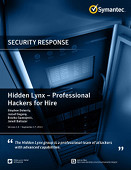The Department of Homeland Security warned firms in the energy sector about new, targeted malware infecting industrial control systems and stealing data. DHS’s ICS CERT, the Industrial Control Systems Computer Emergency Response Team, said it is analyzing malware associated with an ICS-focused malware campaign. The malicious software, dubbed “Havex” that was being spread by way of phishing emails and so-called “watering hole” attacks that involved compromises of ICS vendor web sites. DHS was alerted to the attacks by researchers at the security firms Symantec (which dubbed the malware campaign “Dragonfly”) and F-Secure (“Havex”) -a remote access trojan (or RAT) that also acts as an installer (or “downloader”) – fetching other malicious applications to perform specific tasks on compromised networks. One of those additional payloads is a Trojan Horse program dubbed Karagany (by Symantec) that has been liked to prior attacks on energy firms. According to Symantec, the malware targeted energy grid operators, major electricity generation firms, […]
watering hole
IoT Hackers Await Their Killer App
The next year will see the continued blurring of lines between the worlds of IT security and what we’ve come to think of as the ‘rest of our lives.’ But those who expect to see a large shift in malicious activity to the Internet of Things in 2014 will be disappointed. That, according to a report from the security firm Trend Micro, which argues that Internet of Things malware and attacks are still a ways off – as cyber criminals await a “killer app” that will boost adoption and provide a common platform to attack. The prediction is part of “Blurring Boundaries,” a 2014 outlook report from Trend that argues IoT threats are mostly future-tech. “While we certainly think that attacks on IoT devices and the underlying architecture will be a major area of attack in the future, that future will not be until 2015 and beyond” writes Robert McArdle, […]
Malware Supply Chain Links Eleven Attacks
Fresh off their discovery of a previously unknown (‘zero day’) security hole in Microsoft’s Internet Explorer web browser, researchers at the security firm Fireeye say that they have evidence that a string of sophisticated attacks have a common origin. In a report released on Monday (PDF), the firm said that many seemingly unrelated cyber attacks identified in the last year appear to be part of a “broader offensive fueled by a shared development and logistics infrastructure” — what Fireeye terms a ‘supply chain’ for advanced persistent threat (APT) attacks. At least 11 APT campaigns targeting “a wide swath of industries” in recent months were found to be built on a the same infrastructure of malicious applications and services, including shared malware tools and malicious binaries with the same timestamps and digital certificates. “Taken together, these commonalities point to centralized APT planning and development,” Fireeye wrote. The attacks link at least 11 separate […]
Ephemeral, In-Memory Attack Used With New IE 0Day
It was just last week that we wrote about research from the security firm Triumfant that found evidence for the growing use of ephemeral “diskless” malware. That point was driven home over the weekend, with a report from the firm Fireeye that found a new Internet Explorer zero day vulnerability was being used in conjunction with a disk-less variant of the Hydraq (aka “McRAT”) Trojan horse program. Fireeye first called attention to the existence of attacks exploiting new, “zero day” (or previously unknown) vulnerabilities in the Internet Explorer web browser on Friday. The company discovered the malicious activity on the web site of a “strategically important website” that was being used as a “watering hole” to attack visitors who were “interested in national and international security policy.” The company described two IE vulnerabilities: an information leakage hole and an IE out-of-bounds memory access vulnerability. The information leak affects Windows XP […]
APT-For-Hire: Symantec Outs Hidden Lynx Hacking Crew
This site and others have been writing about the “Advanced Persistent Threat” problem, which has generally been treated as a euphemism for the government and military of The People’s Republic of China or – in some cases – Russia, Iran, North Korea or other un-friendlies. Firms like Mandiant have taken pains to separate the concept of APT from run of the mill cyber criminal hacking groups whose motivation is profit, rather than the acquisition of information that can be used to advance geopolitical or economic goals. Cyber criminal groups may well use “advanced” in their attack methods and “persistent” in their efforts to compromise victim networks, but they weren’t “APT.” Now Symantec Corp. has put a fly into that ointment: publishing a report that pulls the covers off an APT group dubbed “Hidden Lynx” that it claims is responsible for some of the most sophisticated and large scale hacks of […]


